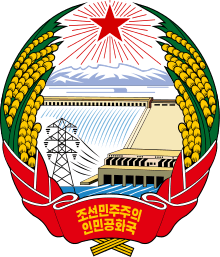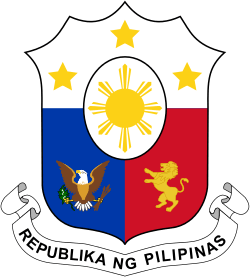North Korea–Philippines relations
 |
|
North Korea |
Philippines |
|---|---|
The North Korea–Philippines relations relates to the diplomatic relationship of the Democratic People's Republic of Korea and the Republic of the Philippines.
Summary
Despite the fact that the Philippines sided with North Korea's belligerent, South Korea, in the Korean War, the two countries finally established diplomatic relations on July 12, 2000.[1][2] This followed more than 20 years of negotiations,[3] although trade between the two countries is almost non-existent, as they both still have a trade embargo. The Philippines was among one of the last Asian countries to establish official diplomatic relations with North Korea.[2]
The 1990 report of the Patterns of Global Terrorism by the United States Department of State says that North Korea has extended some support to the New People's Army, a communist rebel group in the Philippines.[4]
Philippines has a non-resident ambassador in Beijing; and North Korea has representation through its embassy in Bangkok. It was also reported that North Korea proposed to establish a resident embassy in Manila, which Philippine officials rejected. The rejection was reportedly due to Philippine authorities' suspicion on North Korean diplomats as they were deemed to have a reputation to conduct "extra-diplomatic activities" such as smuggling and counterfeiting in other foreign countries. Then-Philippine foreign secretary, Domingo Siazon insisted that North Korea has never made such request. However he remained open to expansion of diplomatic ties between the two countries.[3][5]
In 2007, the agreement was boosted further and was signed by Philippine Foreign Secretary Alberto Rómulo and North Korean Foreign Minister Pak Ui-Chun during the Association of South-east Asian Nations (ASEAN) meeting in Manila.
The Philippines as an ally of South Korea and the United States remains concerned and continues to condemn North Korea's nuclear and missile tests which is believed to be in violation of United Nations Security Council resolutions banning North Korea to use ballistic technology in any purpose.[6][7]
In March 2016, in compliance with the UN Sanctions, the Philippines impounded a North Korean ship Jin Teng but found no explosives or banned substances.[8] Weeks later, another ship Theresa Begonia, was impounded as well but no banned substances were found as either.[9]
References
- ↑ "Joint Communique on the Establishment of Diplomatic Relations between the Republic of the Philippines and the Democratic People's Republic of Korea" (PDF) (in English and Korean). Retrieved 2 December 2014.
- 1 2 "DPRK Diplomatic Relations — National Committee on North Korea". Ncnk.org. Retrieved 1 September 2013.
- 1 2 "3RD LD: N. Korea, Philippines establish diplomatic ties. - Free Online Library". Thefreelibrary.com. Kyodo News International. 12 July 2000. Retrieved 10 June 2013.
- ↑ "1990 Global Terrorism: State-Sponsored Terrorism". fas.org.
- ↑ "Philippines, North Korea agree to boost bilateral relations". Monsters and Critics. Deutsche Presse-Agentur. 29 July 2007. Archived from the original on 14 October 2012. Retrieved 10 June 2013.
- ↑ Carcamo, Dennis (12 December 2012). "Philippines protests NKorea rocket launch". The Philippine Star. Retrieved 10 June 2013.
- ↑ "Philippines to press North Korea to stop missile test". Inquirer Global Nation. 26 March 2012. Retrieved 10 June 2013.
- ↑ http://edition.cnn.com/2016/03/05/asia/north-korea-nuclear-sanctions-philippines/
- ↑ http://www.upi.com/Top_News/World-News/2016/03/15/Philippines-seize-second-North-Korea-operated-ship/2611458059392/

